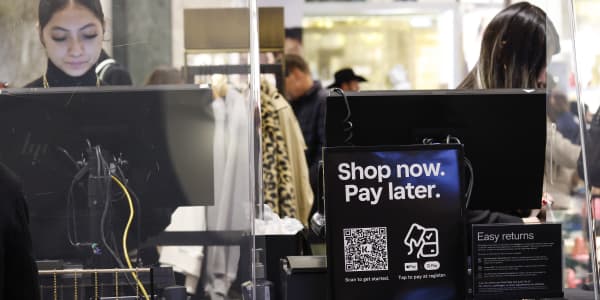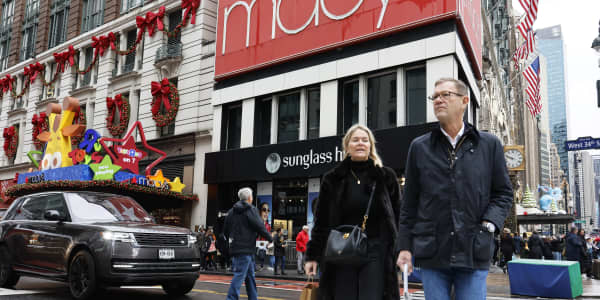In one community, folks can get a jump on their holiday shopping earlier than ever before.
For the first time ever, malls in Paramus, New Jersey, will open on Thanksgiving Day. This move bucks the restrictive laws in Paramus and its surrounding Bergen County that all but prevented shopping on the national holiday.
Paramus is not alone though. Three states—Maine, Massachusetts and Rhode Island—have so-called blue laws that restrict stores from opening on Thanksgiving. And with more stores opening their doors, these laws are coming under intense pressure, with some critics suggesting they are remnants of times past.
Couched in religious principles, blue laws began as prohibitions on secular activities like shopping on Sundays, according to Encyclopaedia Britannica. Over time, the laws were expanded in many states to include national holidays such as Thanksgiving and the Fourth of July.
Although some attribute the laws' moniker to the supposedly blue paper they were once printed on, the ordinances' colorful name likely derives from the archaic usage of "blue" to signify something that is overly moral, according to the encyclopedia.
Read MoreBlack Friday isn't dead! Here's why
Today, blue laws exist only in limited forms, such as a ban on Sunday alcohol sales. Paramus, in particular, is famous for its extensive blue laws that prohibit most retail activity on Sundays and in evenings between 11 p.m. and 7 a.m.
Paramus' laws don't forbid opening on Thanksgiving though. In previous years, malls did not open because it was not cost-effective to do so given the short window of time before the 11 p.m. curfew. But with growing demand—and the earlier opening times of many retailers such as Macy's—it became a more lucrative proposition.

"Westfield Garden State Plaza welcomes the opportunity to accommodate this demand," said Lisa Herrmann-Srednicki, senior director of marketing at the mall, one of three in Paramus that will be opening at 6 p.m. on Thanksgiving.
Consumer pressure
As the change in Paramus shows, Thanksgiving has become a more important part of the holiday shopping season. Last year, 17 percent of U.S. consumers, about 80 million people, said they would shop on Thanksgiving, according to Jesse Tron, director of communications and media relations at the International Council of Shopping Centers.
Read MoreBlack Friday 'deals' not so hot after all: Study
"The pressure is coming from the consumer," Tron said. "The retailers would not be open if the appetite from the consumer wasn't there."
In New England, though, the bans still remain in place and shoppers must wait till Friday to score their deals, despite this demand. Opponents of the prohibitions contend that the laws are outdated in a time when you can go online to shop at any time. Instead of promoting family time on the holiday, they say it hurts brick-and-mortar retailers and local economies.
"Any law that puts your local employers at a disadvantage to compete with the online seller for consumers is something we have to look at," said Jon Hurst, president of the Retailers Association of Massachusetts.
Read MoreWhy Cyber Monday may soon be a thing of the past
Nevertheless, the actual impact of banning Thanksgiving Day sales is likely fairly minimal. While repealing the blue laws may make it easier for some folks to shop, it wouldn't change the amount of money they're spending during the holiday season.
Bottom-line boost?
"It doesn't add an extra $300 to your budget because you're shopping that Thursday," said Kathy Grannis, senior director of media relations at the National Retail Federation.
All that would change is when and where they shop, Grannis said. And even then, these shifts only matter really when considering cross-border shopping.
In New England, residents in a blue law state can easily drive to a state without the restrictions to take advantage of Thanksgiving sales. And in Paramus, the bans once dissuaded New Yorkers from crossing over to shop, despite the lower sales tax in New Jersey.
While these geographical shifts may have pinched budgets in the blue law states, the actual impact on retailers was minimal. A large portion of the retailers that will open on Thanksgiving have locations in more than one state, meaning one state's loss in sales doesn't have as much of an impact on their bottom lines.
Read MoreChristmas creep at a glance: Tracking Black Friday
"From the retailer's perspective, it doesn't matter to a degree if a sale is coming from Massachusetts or New Hampshire," Mary Brett Whitfield, senior vice president at Kantar Retail, said.
So all told, the negatives stemming from blue laws are perhaps not drastic enough to force any politicians' hands in repealing the laws. That said, never underestimate the power of the consumer. Because, at least where Black Friday is concerned, chances are what they want is what they get.
"The consumer wants to go out and shop," Tron said. "Believe it or not, not everybody in this country watches football on Thanksgiving."




